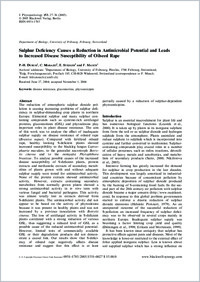Sulphur deficiency causes a reduction in antimicrobial potential and leads to increased disease susceptibility of oilseed rape
- Dubuis, Pierre-Henri Plant Biology, Department of Biology, University of Fribourg, Switzerland
- Marazzi, Cristina Eidgenössische Forschungsanstalt, Wädenswil, Switzerland
- Städler, Erich Eidgenössische Forschungsanstalt, Wädenswil, Switzerland
- Mauch, Felix Plant Biology, Department of Biology, University of Fribourg, Switzerland
-
21.01.2005
Published in:
- Journal of Phytopathology. - 2005, vol. 153, no. 1, p. 27-36
English
The reduction of atmospheric sulphur dioxide pollution is causing increasing problems of sulphur deficiency in sulphur-demanding crop plants in northern Europe. Elemental sulphur and many sulphur containing compounds such as cysteine-rich antifungal proteins, glucosinolates (GSL) and phytoalexins play important roles in plant disease resistance. The aim of this work was to analyse the effect of inadequate sulphur supply on disease resistance of oilseed rape (Brassica napus). Compared with fertilized oilseed rape, healthy looking S-deficient plants showed increased susceptibility to the blackleg fungus Leptosphaeria maculans, to the generalist necrotroph Botrytis cinerea and to the oomycete Phytophthora brassicae. To analyse possible causes of the increased disease susceptibility of S-deficient plants, protein extracts and methanolic extracts of secondary metabolites of plants grown with and without adequate sulphur supply were tested for antimicrobial activity. None of the protein extracts showed antimicrobial activity. However, extracts containing secondary metabolites from normally grown plants showed a strong antimicrobial activity in in vitro tests with various fungal and bacterial pathogens. This activity was almost totally lost in extracts derived from S-deficient plants. The antimicrobial activity did not appear to be based on the activity of phytoalexins because it was present in healthy plants and was not increased by a previous inoculation with Botrytis cinerea. The loss of antifungal activity in S-deficient plants correlated with a strong reduction of various GSL, thus suggesting a reduced level of GSL as a possible cause of the reduced antimicrobial potential. However, limited tests of commercially available GSL or their degradation products did not demonstrate a causal link. Our results show that S-deficiency of oilseed rape negatively affects disease resistance and suggest that this effect is at least partially caused by a reduction of sulphur-dependent pytoanticipins.
- Faculty
- Faculté des sciences et de médecine
- Department
- Département de Biologie
- Language
-
- English
- Classification
- Biological sciences
- License
-
License undefined
- Identifiers
-
- RERO DOC 4130
- DOI 10.1111/j.1439-0434.2004.00923.x
- Persistent URL
- https://folia.unifr.ch/unifr/documents/299704
Statistics
Document views: 199
File downloads:
- Texte intégral: 474
